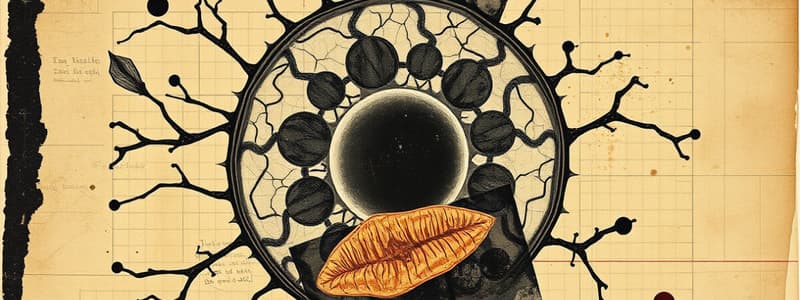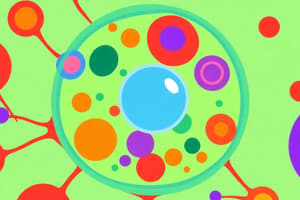Podcast
Questions and Answers
What is the primary function of the nucleus in a cell?
What is the primary function of the nucleus in a cell?
- It serves as the cell's protective barrier.
- It synthesizes proteins.
- It provides energy to the cell.
- It controls cellular activities. (correct)
Which of the following is NOT classified as extracellular materials?
Which of the following is NOT classified as extracellular materials?
- Interstitial fluid
- Blood plasma
- Cytoplasm (correct)
- Cerebrospinal fluid
What role does interstitial fluid play for the cells in tissues?
What role does interstitial fluid play for the cells in tissues?
- It provides a transport medium for nutrients and waste. (correct)
- It acts as a barrier against pathogens.
- It controls the cell's genetic information.
- It strengthens the cell membrane.
Which statement accurately describes the extracellular matrix?
Which statement accurately describes the extracellular matrix?
Why are cellular secretions important for the body?
Why are cellular secretions important for the body?
Which of the following best describes the concept of a 'generalized cell'?
Which of the following best describes the concept of a 'generalized cell'?
Which of the following body fluids is considered a type of extracellular fluid?
Which of the following body fluids is considered a type of extracellular fluid?
How does the extracellular matrix vary in different tissues?
How does the extracellular matrix vary in different tissues?
What did Rudolf Virchow contribute to cell theory?
What did Rudolf Virchow contribute to cell theory?
Which of the following is NOT one of the four concepts of cell theory?
Which of the following is NOT one of the four concepts of cell theory?
What part of the human cell acts as a selectively permeable barrier?
What part of the human cell acts as a selectively permeable barrier?
How does the shape of a cell relate to its function?
How does the shape of a cell relate to its function?
What is one reason that loss of cellular homeostasis can lead to disease?
What is one reason that loss of cellular homeostasis can lead to disease?
What role does cytoplasm play in the cell?
What role does cytoplasm play in the cell?
What defines the biochemical activities of cells according to the principle of complementarity?
What defines the biochemical activities of cells according to the principle of complementarity?
Why is it important to study the properties of cells?
Why is it important to study the properties of cells?
Flashcards are hidden until you start studying
Study Notes
Historical Background of Cell Theory
- Robert Hooke first observed plant cells in the late 1600s with a primitive microscope.
- In the 1830s, Matthias Schleiden and Theodor Schwann formulated that all living organisms are made of cells.
- Rudolf Virchow later asserted that cells come only from pre-existing cells.
Cell Theory Concepts
- A cell is the fundamental structural and functional unit of all living organisms.
- Organism activity is reliant on the collective and individual functions of its cells.
- Cell activities are influenced by their shape and the number of subcellular components.
- Cells originate only from other cells, confirming cellular continuity.
Characteristics of Cells
- Cells include over 250 distinct types in the human body, showcasing variations in shape, size, and function.
- Example cell types include:
- Disc-shaped red blood cells.
- Branching nerve cells.
- Cubelike kidney tubule cells.
- Cell lengths range from 2 micrometers in small cells to over a meter in nerve cells.
Structure and Functions of Human Cells
- Human cells comprise three main components:
- Plasma membrane: Selectively permeable barrier and outer cell boundary.
- Cytoplasm: Intracellular fluid containing organelles that carry out specific functions.
- Nucleus: Central organelle regulating cell activities.
Extracellular Materials
- Extracellular materials are crucial and exist outside of cells, contributing to body mass.
- Types of extracellular materials include:
- Body fluids: Interstitial fluid, blood plasma, and cerebrospinal fluid serve as transport and dissolving media.
- Interstitial fluid nourishes cells with essential compounds and waste removal.
- Cellular secretions: Aid digestion and provide lubrication (e.g., saliva, mucus).
- Extracellular matrix: A protein and polysaccharide-rich substance that organizes and supports cells, particularly abundant in connective tissues.
- Body fluids: Interstitial fluid, blood plasma, and cerebrospinal fluid serve as transport and dissolving media.
Recap of Cell Theory
- The cell serves as the basic unit of life.
- Organism functionality depends on cellular activities.
- Cell functions reflect their physical structure.
- New cells derive only from existing cells.
Generalized Cell Concept
- A generalized cell represents a composite cell concept that encompasses the essential features and functions common to all cell types, regardless of specific characteristics.
Studying That Suits You
Use AI to generate personalized quizzes and flashcards to suit your learning preferences.





